
Plasma gel and PRP treatments improve skin and hair with minimal side effects.
August 2023 in “Diagnostics” Ultra-high-frequency ultrasound effectively evaluates the impact of hyaluronic acid fillers in reducing nasolabial fold wrinkles over time.
May 2021 in “Journal of the Endocrine Society” Female pattern hair loss severity is linked to physical signs of high androgens, not blood hormone levels.
[object Object]  January 2024 in “Journal of Cosmetics, Dermatological Sciences and Applications”
January 2024 in “Journal of Cosmetics, Dermatological Sciences and Applications” Injecting a peptide-hyaluronic acid mix improved hair growth in men with hair loss and was safe.
 October 2013 in “Journal of Investigative Dermatology”
October 2013 in “Journal of Investigative Dermatology” Collagen VII helps skin heal and stay strong, sirolimus may lower skin cancer risk in kidney transplant patients, high-molecular-mass hyaluronan helps naked mole rats resist cancer, dermal γδ T cells aid in hair growth in rodents, and overexpression of IL-33 in mouse skin causes itchiness, offering a model for studying allergic inflammation treatments.
 45 citations,
October 2014 in “Stem cell research & therapy”
45 citations,
October 2014 in “Stem cell research & therapy” Modified rat stem cells on a special scaffold improved blood vessel formation and wound healing in skin substitutes.
[object Object] The modified stem cells with VEGF165 in a special scaffold improved blood vessel growth and wound healing for skin repair.
November 2022 in “Cureus” New biomaterial treatments for baldness show promise, with options depending on patient needs.
1 citations,
November 2020 in “Cureus” Clinical signs of hyperandrogenism are related to female pattern hair loss severity, but biochemical markers are not.
 September 2017 in “Journal of Investigative Dermatology”
September 2017 in “Journal of Investigative Dermatology” Hair care products used for 4 weeks made hair smoother.
 November 2024 in “Journal of Cosmetic Dermatology”
November 2024 in “Journal of Cosmetic Dermatology” Early treatment can reverse hair loss from dermal fillers.
9 citations,
September 2016 in “Forensic science international” Hair area varies with age and sex, but hair index and medullary index do not.
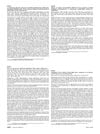 February 2010 in “Journal of The American Academy of Dermatology”
February 2010 in “Journal of The American Academy of Dermatology” Social or cultural norms, not hair type, more likely influence how often people wash their hair.
 26 citations,
April 2007 in “Journal of pediatric gastroenterology and nutrition”
26 citations,
April 2007 in “Journal of pediatric gastroenterology and nutrition” A teenage girl with high androgen levels and PCOS developed a rare liver tumor, suggesting a possible link between high androgens and the tumor's growth.
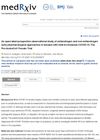 6 citations,
October 2020 in “medRxiv (Cold Spring Harbor Laboratory)”
6 citations,
October 2020 in “medRxiv (Cold Spring Harbor Laboratory)” Early treatment improved COVID-19 outcomes, and spironolactone helped reduce risks in females with high androgen levels.
 16 citations,
March 2014 in “Journal of the European Academy of Dermatology and Venereology”
16 citations,
March 2014 in “Journal of the European Academy of Dermatology and Venereology” Korean patients with PCOS often have skin problems like acne and excess hair, with different symptoms based on their specific PCOS type.
2 citations,
June 2018 in “Jurnal Penelitian dan Pengembangan Pertanian” Antioxidant-rich maize varieties can improve health and need local support for widespread farming.
 1 citations,
January 2018 in “Journal of Cosmetic and Laser Therapy”
1 citations,
January 2018 in “Journal of Cosmetic and Laser Therapy” The editorial introduces various topics on laser and cosmetic treatments in a medical journal.
 September 2013 in “Regenerative Medicine”
September 2013 in “Regenerative Medicine” γδ T cells help with hair growth during wound healing in mice.
 89 citations,
January 2009 in “Advances in Clinical Chemistry”
89 citations,
January 2009 in “Advances in Clinical Chemistry” Fetal skin heals without scarring due to unique cells and processes not present in adult skin healing.
 79 citations,
January 2018 in “Wiley Interdisciplinary Reviews-Developmental Biology”
79 citations,
January 2018 in “Wiley Interdisciplinary Reviews-Developmental Biology” Understanding how baby skin heals without scars could help develop treatments for adults to heal wounds without leaving scars.
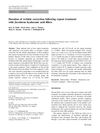 48 citations,
October 2010 in “Archives of Dermatological Research”
48 citations,
October 2010 in “Archives of Dermatological Research” Juvéderm fillers effectively reduce wrinkles for up to 21 months with less filler needed for repeat treatments.
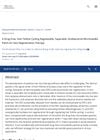 31 citations,
July 2022 in “Advanced healthcare materials/Advanced Healthcare Materials”
31 citations,
July 2022 in “Advanced healthcare materials/Advanced Healthcare Materials” A drug-free microneedle patch significantly promotes hair growth and prevents infections.
 29 citations,
September 2012 in “Birth Defects Research”
29 citations,
September 2012 in “Birth Defects Research” Wounds heal without scarring in early development but later result in scars, and studying Wnt signaling could help control scarring.
 27 citations,
July 2017 in “Facial Plastic Surgery”
27 citations,
July 2017 in “Facial Plastic Surgery” Platelet-Rich Plasma (PRP) shows promise for hair growth and skin improvement in aesthetic surgery.
 15 citations,
March 2015 in “Facial plastic surgery”
15 citations,
March 2015 in “Facial plastic surgery” The article compares different products for rejuvenating the upper part of the face.
13 citations,
May 2019 in “Archives of dermatological research” Tranexamic acid reduces skin aging more in female mice.
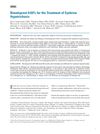 7 citations,
April 2017 in “Dermatologic surgery”
7 citations,
April 2017 in “Dermatologic surgery” Hyaluronic acid fillers and combination treatments significantly improve facial defects from autoimmune diseases and are well-tolerated.
5 citations,
February 2021 in “Gels” HYDRO DELUXE BIO hyaluronic acid hydrogel is compatible with skin cells, may reduce inflammation, promote blood vessel growth, and protect against oxidative stress, suggesting it could help revitalize hair follicles.
 3 citations,
November 2021 in “Clinical, Cosmetic and Investigational Dermatology”
3 citations,
November 2021 in “Clinical, Cosmetic and Investigational Dermatology” Platelet-Rich Plasma may improve skin health and reduce wrinkles, but more research is needed for standard treatment guidelines.





















